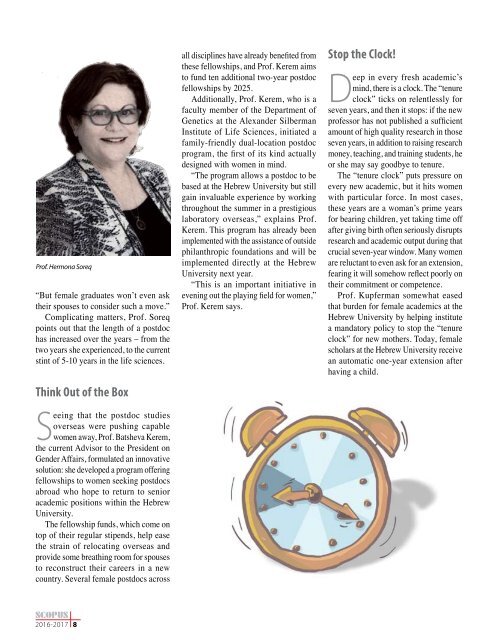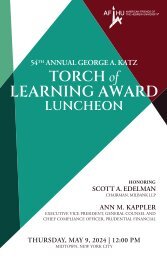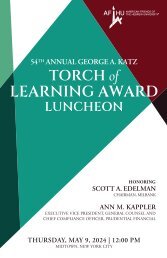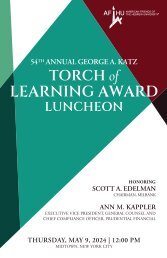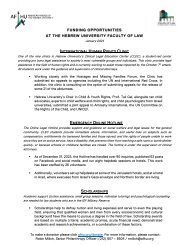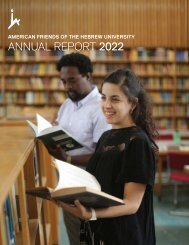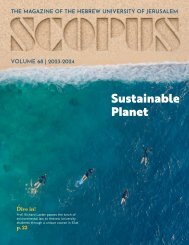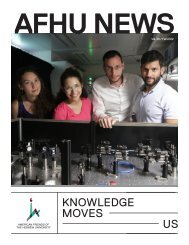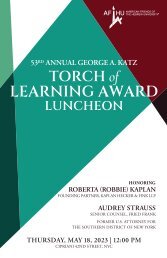Create successful ePaper yourself
Turn your PDF publications into a flip-book with our unique Google optimized e-Paper software.
Profiles<br />
Faculty<br />
“Academia is a good place for women.<br />
Women should seek out all the<br />
help they can from family, pursue<br />
fellowships and stop stressing out because<br />
it doesn’t help.”<br />
“Women in general, and Arab women in particular,<br />
face many obstacles and difficulties integrating<br />
into academia. These barriers must be addressed at<br />
the different levels of society. Despite the challenges,<br />
no women should give up.”<br />
Prof. Mona Khoury-Kassabri, Faculty of The Paul Baerwald School of<br />
Social Work and Social Welfare (see pg 14)<br />
Prof. Mimi Ajzenstadt, Dean of The Paul Baerwald<br />
School of Social Work and Social Welfare (see pg. 12)<br />
“I’m the director of a busy research lab,<br />
a married mother of four, and – you<br />
may be surprised to hear this – a former<br />
professional basketball player. From each of<br />
these experiences I’ve learned that the secret<br />
of success is keeping your team happy, and<br />
earning their support. While every scientist<br />
should be judged on his or her own merits, I<br />
think women – as team members – have the<br />
home-court advantage.”<br />
Dr. Galia Blum Nanoscientist, Faculty of Medicine (see pg. 13)<br />
“It is hard combining motherhood with research<br />
but I’ve never known anything else—I had my<br />
first child when I was in graduate school, and<br />
now we have three sons. My husband and I did our<br />
doctorates and postdocs together; we always split our<br />
family responsibilities equally.”<br />
Prof. Tamar Ziegler, Faculty of Science (see pg. 15)<br />
“In the humanities, women academics are<br />
in the minority, but their presence is very<br />
important. Not only do we serve as role<br />
models for our female students, we open up the<br />
discussion of women’s experience in society –<br />
something that might otherwise be overlooked.”<br />
“The main ̔problem’ faced by<br />
women who make a career<br />
in academics is that we have<br />
very high standards, and demand<br />
excellence in everything – both at<br />
work and at home.”<br />
Dana Reichmann, Faculty of Science (see pg. 16)<br />
“I can’t tell you how many<br />
times I was asked at lectures<br />
ʻare you sure it says that in the<br />
Talmud?’ I don’t think my male<br />
colleagues would be asked the<br />
same question.”<br />
Prof. Elishiva Baumgarten, Faculty of<br />
Humanities (see pg. 13)<br />
“Since becoming head of<br />
the Israel Institute for<br />
Advanced Studies, I’ve<br />
worked hard to promote<br />
women in science – creating<br />
frameworks for young<br />
women to study and advance<br />
together.”<br />
Prof. Michal Linial, Alexander<br />
Silberman Institute of Life Sciences<br />
(see pg. 17)<br />
Prof. Manuela Consonni, Faculty of Humanities (see pg. 16)<br />
<strong>2016</strong>-2017 10


